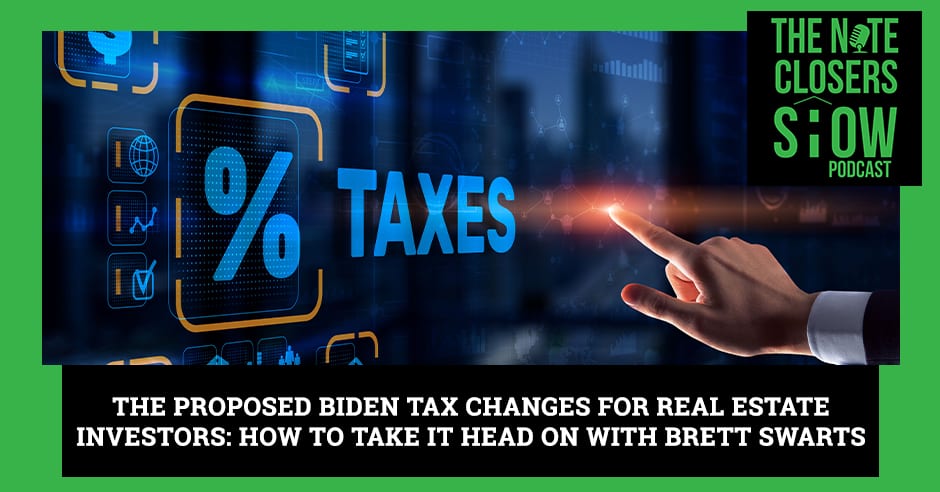
A new administration means having to face big changes that are bound to happen in the real estate industry. In this episode, Scott Carson talks with Brett Swarts from the Capital Gains Tax Solutions to talk about the proposed tax plan and changes that Joe Biden is looking to implement. They also discuss the potential death of the 1031 exchange, long-term capital gains, and other potential changes that will affect real estate investors. Preparing for these, Scott and Brett then break down some tips and alternatives to tackle the shifts head-on while welcoming new opportunity zones to breakthrough.
—
Watch the episode here
Listen to the podcast here
The Proposed Biden Tax Changes For Real Estate Investors: How To Take It Head On With Brett Swarts
I’m excited to be here and to bring back a previous guest on the show here. This guy is doing amazing things. You may have known him from the Note CAMP Commercial, on one of the show‘s episode or even in Note Night in America. With everything going on in the election and all the proposed estimated tax changes that President Joe Biden is probably going to do, it was relevant to bring Brett Swarts back on from the Capital Gains Tax Solutions Podcast. What’s going on, Brett? How’s it going out in Sacramento?
Scott, it’s going fine. We’re still here in California, trying to figure out taxes and ways to stay creative and stay legal. We’re doing fine.
Let’s start breaking down some of the biggest changes. Let’s start first with what’s going to impact you the most there, talking about doing away with 1031 exchanges. Before we dive into it, let’s talk a little bit about what a 1031 exchange is for those that are reading and go from there.

Proposed Biden Tax Changes: A 1031 exchange is a way to defer capital gains tax when you sell a highly appreciated investment real estate and buy another.
A 1031 exchange is a way to defer capital gains tax when you sell a highly appreciated investment real estate and two, in order to buy another one. It’s trading real estate for real estate, as long as it’s an investment. There are some rules behind it. You got to do it within 180 days from the time you purchase the next one. You typically have to identify within 45 days the properties you’re going to buy. A lot of people will choose an accommodator, get that set up beforehand and go to sell their asset. The funds will go to that accommodator. That keeps it from you, you the taxpayer, from taking it into your hands, therefore, it remains in a tax deferral state. From the accommodator, you buy another property.
It’s very well–known. It’s a great strategy. It’s a great way to keep people incentivized to move assets, to take a 50–unit apartment complex and then up upgrade to 100 units. Renovate those and create more jobs. It’s part of the greater general study of macroeconomics, which if we can keep the funds flowing, we create more jobs, spur more economic growth and in turn, more tax revenue comes. That’s why it’s lasted for so long. In fact, 1031s go back to the 1920s. There was a big Starker exchange case in the ‘50s that changed some things and another case in the ‘80s that clarified some things. They have become very popular. If you’re in real estate and you’re investing, you know a 1031. We’re hoping though that it stays around here.
If it is taken away, what do you see be in the impact? Do you think more people will be going into the deferred sales trust that you work with? How’s that going to go?
The first thing you’ll see more people do if this happens is what I like to call the hold, refi scenario and buy. In a refinance, it’s not taxable. When I started in Marcus & Millichap in 2008, one of the things I found for the people who did the best was they didn’t take on too much debt and they never sold. They may not have gone as fast as some of the others but they also didn’t take as much risk. What they would do is they need to buy something all cash or on leverage, build it up and then refinance but only refinance up to 50% so they have that extra cushion. They wouldn’t over leverage in case the market shifted. They would accumulate assets.
Think of it like a monopoly board where you are going to buy assets. You just got to be careful not to over leverage. I thought this was interesting. A lot of people will do that. They’ll hold on to what they have. It will stifle the brokerage business and sellers from selling. It’ll have even less inventory for people to buy because people are going to be less incentivized to sell because they don’t want to pay the 50% in capital gains tax. This is also something to understand. Depending on what state you live in and where you’re at, it’s 20% Federal. California is a 13.3% state. Obamacare is about 3.8%. You add depreciation recapture on that. You have somewhere between 30% and 50%.
Some other states might be a little bit lower but that’s what’s hurting people. That gain would be taxed, therefore, if you can’t defer it, why would you sell it? Even if you think about the people who own stocks, you cannot 1031 stocks. You cannot 1031 primary homes or even businesses for that matter. That stifles people from selling because they can’t defer the tax. Unfortunately, that will be the biggest impact. People won’t sell and then the refinance. We can talk about other alternatives if you’d like as well.
Let’s talk about those.
The next thing would be looking at what else someone can do. As of this point, you have, which is a nice thing, called an opportunity zone where you can park funds upon a sale. It’s similar in the timing for the 1031. You got a place within 180 days those funds. Let’s say you sold a $5 million appreciated property and you had $1.5 of taxable gain. You have the ability to put the gain into this opportunity zone. As a part of that, you can defer it for a number of years and then you need to pay it back but then you also have a chance to get some tax-free growth. It also depends if they extend that as well because it does take ten years to do that. That will become more popular.
The second one would be maybe something like a charitable remainder trust where you can start to give some of this stuff away to charity. The one that we were most excited about and what we specialize in is what’s called the deferred sales trust. We think it’s the best of both worlds because it gives you the chance to sit on the sidelines, not have to pay tax or defer the tax and then go back into real estate whenever you want to. One of the best stories to illustrate this is in 2006. A gentleman sold a $20 million asset in Minnesota. He parked it on the sidelines with the deferred sales trust because he couldn’t find a suitable 1031. The 1031 has been available but the prices were too high.

Proposed Biden Tax Changes: In the meantime, focus on what we can control, what is legal, and what is available, making sure we’re taking advantage of each of those things to help our clients, partners, and friends create and preserve more wealth.
Years later, he bought back that same property that he sold at $0.60 on the dollar. The way he was able to do it is through his trust. It’s like a self-directed IRA. It’s like parking it in a 401(k). You can use the 401(k) or the SEP IRA to partner with you to buy that deal, except there are none of the rules for that. It’s IRC 453, if people are wondering, which is separate from IRC 1031. Those are tax codes. What Biden is proposing is to eliminate the 1031 exchange, which is 1031 versus IRC 453. We think that if the 1031 second away, business will skyrocket for the deferred sales trust or other alternatives like the opportunity zones. The 1031 is probably the most dominant and of all of those, the most well-known that most people use.
Is there an amount, as far as an investment amount, a taxable amount or sales amount that people need to be aware of that could probably affect more so that would qualify better for the opportunity zones or more for the deferred sales trust?
We found our new minimums given the level of business we’ve done as $1 million net equity into the deferred sales trust and a sum around $250,000 to $300,000 or so of a liability deferred. If you have those numbers, then the deferred sales trust we think is a good fit. Opportunity zones can always be a good fit or even ahead. You can do a partial opportunity zone, a partial deferred sales trust to diversify. We’ve had some clients that are doing that. It depends on what the needs and the goals are of the client. One of the areas that we found is if you’re a Baby Boomer, you’re part of the $17 trillion that’s going to pass in the next years. It’s part of the largest wealth accumulation and transfer in the history of the planet. That’s happening.
In fact, there are about 10,000 Baby Boomers turning 65 every single day in the US in about $77 million. This is all according to a survey, the American Bankers Association did. If you’re a Baby Boomer, your needs and wants might be a little bit different than if you’re younger. We found that a lot of them don’t want the toilets, the trash, the liability. They want time, travel, liquidity and diversification. The deferred sales trust is a nice fit for that client who’s looking for some options there, the ability to access the cash and spend it if they want to. Pay the tax, of course and/or go into deals of their own if they ever want to, never have to go into a real estate deal ever again or even go with like Scott and invest into some alternatives. Do some money lending.
We had a client who put $2 million with a previous lender that he had worked with as a way to hedge against the real estate buyers that were so high. He’s liking that scenario. This is all through the deferred sales trust. That is available as well. If you’re younger and you still want to do deals or you find a nice opportunity zone deal, then by all means, go for that. Perhaps you don’t need the liquidity. You can let it be tied up for maybe ten years. Maybe it could be a good fit. It‘ll depend on what you’re looking for. I’ll also mention the deferred sales trust works for primary homes. We did an $8.3 million deal in Palo Alto. There was a $45 million primary home deal closed in Montecito. It works for dentists, optometrists or veterinarians. The 1031 does not work for a primary home and for a business. An opportunity zone does. That’s nice. You can use that for those other sales and other assets. Clarifying what you want, what you need and then executing that strategy.
Can you explain the opportunity zones? Where are they located at? What are you seeing in those areas?
The opportunity zones were something that the government did. This is part of the Trump tax plan years ago. It’s a bipartisan effort, which was one of the few that had wide support. What they did said is, “How do we take capital that’s tied up in these highly appreciated assets? It could be stock, businesses, real estate. How do we redeploy that incentivize people to sell and put it into areas that perhaps are under underserved or have been maybe ignored a little bit and try to revitalize communities?” To what I’ve gathered, it’s been successful for doing exactly what it was intended to do.
They have a map. They got with the states. The states identified certain parts of different cities. You can look upon opportunity zone map and then see that. If you want to invest, I would always encourage you to just don’t go out and shotgun, shoot this. Make sure you’re working with somebody who’s already A, been in real estate, B, has already owned or identified properties, C, if it happens to be an opportunity zone, it’s great. You never want to let the tax tail wag the investment dog. Be careful too. Some of the values have jumped. It’s opportunity zone, so they’ve already been factored in. That savings may not even be there. Make sure you’re underwriting.
It’s more important than ever to underwrite and understand values of real estate. Inventories are low, prices are all time high. We think that values will shift, whether it’s 6, 12, 24 months, there’s going to be opportunities for lower values. If you find a deal, great. Put it in there with the experienced operator. Become a partial investor and buy those deals. We have some deals in Texas. We have one in San Antonio that I worked with a proven operator that I like. You can find those if you search hard enough but be careful that you’re not overpaying.
That’s the biggest thing. We’re going to see a reduction, especially a lot of commercial deals here once we figure out what’s going to happen with all the eviction and foreclosure restrictions being lifted, expiring or if they get extended. Who knows what’s going to happen? What other issues of the proposed tax plan jump up at you as things that people need to watch out for?
It’s the increases in taxes. It’s a very different approach. There’s more regulation, more taxes, more spending. Trump also spent a lot of money but he also grew the economy pretty good it seemed like from what I’ve gathered. There are a lot of changes. COVID–19 is still unknown with what might happen with shutdowns again. It’s now more than ever more important to plan, to preplan and have a plan A, B and C. You’ve got to do your homework. You’ve got to get with the professionals. What I like about our team and the deferred sales trust is we take all the pressure off and say, “We’re not going to charge you anything, unless you do the deal. We’re giving you the pros and cons of each strategy. You decide what you want to do.“
One thing to mention too, though, for the 1031, which is interesting with the DST if they take away the 1031, part of it is a household income. If it’s greater than $400,000, then it eliminates. If your household is below that, then you can still use it. Realize that if you’re below. The key is how do I stay below that $400,000 mark? The part of the deferred sales trust, what’s unique about it is you can sell an asset, move it into the DST and then you can decide to keep that cashflow pouring on top of itself. Think of it like putting it into an IRA and you’re not taking any income from that IRA. You’re letting it grow, tax–deferred and all of the income is compounding. It’s the same thing with the deferred sales trust.
Let’s say there was someone out there who made $500,000 a year. They’re like, “I don’t qualify.” They have an asset they’re going to sell. That particular asset is producing $150,000 per year. They could sell that asset, move into the deferred sales trust and all of that can do cashflow. They could pour into it. Guess what their ordinary income does? We dropped it by one $150,000 then they’re at $350,000. They’re below that $400,000 mark. There are going to be some creative ways to put these different strategies together. The key would be, “How do we lower your overall AGI in order for you to qualify for maybe what you want to do, which is that 1031?” There’s going to be a lot of talks about those kinds of things. We don’t know. The biggest thing is Georgia, whether the senate will stick with the Republicans or go with the Democrats. At that point, even still, it might take some time for these 1031 to go through. I doubt we’ll see any major change but it’s always good to prepare.

Proposed Biden Tax Changes: You want to be cautious more than ever. Get out of debt. Get liquidity. Preserve your wealth. Stack up your cash.
One of the things that stand out the most too is his proposed changes to the long-term capital gains tax. They are looking to increase those from 24% up to roughly 43% in a lot of cases. That means you need to be planning on when you look to exit or keep it, hold onto it for a while too.
We get that all the time. People are like, “Should I sell and pay the tax?” I’m like, “Slow down. Whether it’s 23% or 24%, don’t get excited about paying 23%.“ That’s the rule of 72%, which states we can earn 7% on any given amount over any ten–year period. We can double that amount. Let’s take this scenario. It’s a $5 million asset. You had a $1 million basis. You had a $4 million gain. That’s about a $1.5 million liability as it stands, maybe about 33% or so. Even if it was a little bit lower, it’s still $1 million of tax. That’s substantial. Why don’t we keep it deferred?
We define losing as paying the tax has gone forever. We define winning as deferring the tax. We want to defer it. Whether it’s 23% or 40%, let’s keep that wealth in your state. Let’s keep that wealth with your family. Let’s grow it. Live off the income as you like to receive it. The other side of it, which some people completely forget about, is the estate tax, which is 40% of anything if you’re worth $22 million married and $12 million single. Those are set to expire in 2025. Given where the presidency is going, we probably think that this will expire and they’ll drop that to $12 million married, $6 million single. Let’s do the math there. If you’re worth $52 million and you’re married and all $52 million is inside your taxable estate, you’re looking at with the $30 million left inside of the exemption, $22 million minus $52 million, that’s $12 million, 40% on that amount.
The intent is to get it outside your taxable state. The challenge is you can’t get it out fast enough. This is where the deferred sales trust is pretty amazing. One single deal we could sell at a $30 million asset and move it all outside the taxable estate saving that 40%. Saving that 40% versus paying that away has nothing to do with the stepped–up basis. These are all the type of capital gains tax, estate tax you want to be prepared for. You want to be working on so that you’re not caught off guard and so that you’re not paying more tax than you legally want or need to.
The death tax as they call it. A lot of people are hurting there in a lot of phase. It’s been a lot of tax because they don’t know the options that are available to them. Another thing that jumps out to me is the QBI. They look in the phase at Qualified Business Income Deduction moving that, doing away with that over time. That can add a lot of people, especially those that are making over $400,000 grand a year too.
All of the above. It’s brutal to think about where we’re going here and what it’s going to mean for business owners, higher income earners, for those who want to grow businesses and create more jobs. It’ll be interesting a shift, for sure. It seems like it’s going to be Biden given everything we know. We’ll see how the next years shake out. At the meantime, we focus on what we can control, what is legal, what is available and making sure we’re taking advantage of each of those things to help our clients, partners and friends create and preserve more wealth.
We all want to do big things out there. Many people are looking to do big things. I believe we’re going to see a lot of opportunity here, not only on the residential note side, especially distress debt but a lot on the commercial side of things. I’ll give an example. Hotels right now are going like $0.20 or $0.25 of what sell. That’s what we see they’re trading at. There’s a lot of opportunity buying a $4 million hotel for $1 million and then working it out to either take the property back or work with that stuff. All these things are something that people need to keep in mind on what their final exit strategy is going to be. Do we sell it? We foreclosed on and try to sell the auction or look to take it back and hold onto it for a while. There’s a lot of moving parts to what the next few years hold for everybody.
There are many moving parts. I’ve even seen since the election, when that happened, a mass exodus when our deals have spiked because people are trying to figure out exactly what they’re doing before the big change has happened. It’s going to be interesting months for sure in 2021.
Is there anything else about the tax plan that jumps out at you?
There’s nothing that we haven’t already touched so far. We’ll see what changes are made and when. Let’s pivot on that plan.
If it’s a divided House and Senate, it’s going to drag things out and drag changes being made for sure. It’s interesting to start preparing, start reading, start researching and putting proper plans in place to take advantage of tax savings, any way you can, one way or another.
That’s exactly what we’re here for.
Are there any big surprises that have popped up with some of your clients or people reaching out to you a little bit more so?
We’re getting an increase in folks who are looking to sell cryptocurrency, which made a little run here. The deferred sales trust works for that. We’ve had an increase in a lot of mergers and acquisitions for some large business sales and people, especially who have multiple partners in a sale. They’re all looking to have their own deferred sales trust, which is nice. That’s also boosted. We’ve saved probably 8 or 9 failed 1031 exchanges. Low inventory financing are becoming more challenging with some banks tightening up their requirements. In general, we‘ve seen a surge of new business for us because people want liquidity, diversification and freedom, either with the income that comes in or to freeze it, if they don’t want it to come in.
We’re becoming more and more popular, more and more mainstream as we close more deals. It’s not new to us but it’s a new to a lot of other people. The deferred sales trust stress is getting a whole lot of momentum. I’m in the commercial real estate brokerage world and that’s when I started out. I’ve seen a pivot there as well. For our readers, if you’re in the commercial real estate brokerage world, even in the residential world for that matter, I aligned with and hung my broker’s license under a group called eXp Commercial. They’re using a model, which is fascinating where instead of paying the big box corporate store who has a lot of expense, they’re taking that savings. They’re moving it into the cloud.
In COVID19, a lot of people are working from home or home offices. They’re saying, “How do we do train online? How do we collaborate online?“ That stock has skyrocketed. It went from an $8 a couple of years ago. It went up to $60 then to $50. There are 40,000 agents. That was on the residential side. Most people have heard of it on that but then it’s on the commercial side. The commercial side, for the longest time has been an old model. The old model has been one of non-innovation, whereas residential in general has been more innovative. They did that. A lot of people said it won’t work but it’s working. It’s skyrocketing.
They’re taking it to the commercial. They formed a whole separate but under one umbrella with new leadership. I’m like, “This might be the most exciting thing for commercial real estate brokers to get on the other side of the phone without having to own real estate but by training and closing deals like they’ve always done and get that what’s called revenue share,” It’s transformational. I’m curious to see, not only with the Biden tax plan or the changing of certain things but also how it affects different industries, even the note business, owning real estate or how it’s owned. We’re in a season or two of change and pivoting. How are you going to be in front of that? How are you going to position yourself and your family to earn a lot of wealth? How are you going to change the industry forever? That I’d say is the biggest thing that I’m looking at, seeing and trying to get my hands around.
I do agree that any type of those platforms was with old business. A lot of the commercial brokers, it’s the old way of doing things. Everybody’s got to shake it up to get more of that cloud base, that virtual learning experience. When you remove the brick and mortar aspect of a business, you do remove a lot of costs and a lot of overhead that can be passed onto your clients or staff in a variety of ways. In this case, other realtors or other CCIMs and things like that too.
I think it’s going to flip upside down and explode. I’m excited to train and coach. We’re launching a second show, Expert Commercial Real Estate Secrets Podcast. We’re going to bring in on brokers and lenders. It’s going to be focused on the top of the industry, looking at the model and dissecting the journey here as I’ve transitioned myself and my team, bringing on those who’ve also done the same to see how this works so that you can also use a little plug there. You can check that out as well if you like.
Are any of your teammates or any of your fellow commercial realtors starting to see a lot of phone calls or feelers from the different banks and lending institutions out there about some of the market, the asset class, potential REOs or pricing? I’ve got a couple of buddies that are in the appraisal and inspection area. They’ve been very busy with a lot of banks reaching out to them to pull valuations on properties that they haven’t foreclosed on yet. I haven’t started with everything being crazy like it is.
Generally, yes. The banks are tightening up their requirements, underwriting their current deals and pulling back. It was also interesting too. Wells Fargo personally said, “You haven’t used your credit line.“ I had there personally. They sent out a letter saying, “We closed your credit line.“ I’m like, “That’s interesting.“ Banks are closing credit lines on people. They’re pulling back. They’re preparing. As you see these things happen, it could be a sign for what’s going to be coming here. That’s happening. You want to be cautious more than ever. Get out of debt. Get liquidity. Preserve your wealth. Stack up your cash is. That’s what we love the deferred sales trust because it’s the one thing where you don’t have to pay equal or greater value, exchange and overpay for property.
You can pay off all your debt. Move it into the deferred sales trust and sit there ready to go. Go into some alternatives like investing in notes, investing into stocks and bonds. Also buying real estate but in smaller chunks versus one big chunk, one property, one location with all this debt. Don’t do what happened in 2008 all over again. We already knew that story. Not that 2008 is going to happen, like it did but still. If you’re looking at your net worth regardless of what age you are, realize that liquidity and time is your friend. Being out of debt is your friend. Be patient. Wait for a deal to hit you over the head. When it does, you can strike with the deferred sales trust, all tax deferred. It’s a lot of fun to do it that way.
What’s the best way for our readers to reach out to you to find more about what you do and see if it’s a fit for what their future, sales retirement and tax plan is all about.

Proposed Biden Tax Changes: Being out of debt is your friend. Be patient. Wait for a deal to hit you over the head. When it does, you can strike with the deferred sales trust, all tax-deferred.
There are three websites. The first one would be CapitalGainsTaxSolutions.com. That’s the main deferred sales trust education there. You can get a free eBook, Sell Your Real Estate or Business Smarter in 9 Steps. Get that right away. The second one would be if you’re a professional who want to offer the deferred sales trust, you can go to ExpertTaxSecrets.com. The last one would be ExpertCRESecrets.com. That’s all has to do with the brokerage industry and looking how to underwrite the model, taking your pride out of the way, underwriting the model to see if it’s a good fit to join eXp Commercial and study that journey. Those are the three places.
Brett, thanks so much for coming on the show sharing your insight to the proposed tax changes and everything that‘s going on in this crazy market we call 2020.
I appreciate it, Scott. Thanks for having me on.
Guys, go out. Take him up on his information. Check it out. The more educated you are, the more knowledge we learned about the opportunities and the changes in the end. We all can’t change things. We all know there are a couple of things that are guaranteed, death and taxes. As the tax rate change, you have to find work arounds and solutions to what may not be working or may not be available anymore. I’ve never ever regretted paying for good tax and legal advice out there. Go out. Take some action. Check out what Brett is doing. We’ll see you all at the top.
Important links:
- Note CAMP Commercial
- Episode – The Deferred Sales Trust: Avoiding Capital Gains Tax with Brett Swarts
- Note Night in America – Previous episode with Brett Swarts
- Capital Gains Tax Solutions Podcast
- American Bankers Association
- Expert Commercial Real Estate Secrets Podcast
- CapitalGainsTaxSolutions.com
- Sell Your Real Estate or Business Smarter in 9 Steps
- ExpertTaxSecrets.com
- ExpertCRESecrets.com
About Brett Swarts

Brett Swarts is considered one of the most well-rounded Capital Gains Tax Deferral Experts and informative speakers on the west coast. His audiences are challenged to lean into multiple capital gains tax deferral strategies, create and develop a tax-deferred transformational exit wealth plan of their own, and execute on this plan so they can create and preserve more wealth.
Brett is the Founder of Capital Gains Tax Solutions and host of the capital gains tax solutions podcast. Each year, he equips hundreds of business professionals with the Deferred Sales Trust tool to help their high net worth clients solve capital gains tax deferral limitations.
Brett lives in Roseville California, with his wife, Melanie and their 5 children.
Love the show? Subscribe, rate, review, and share!

